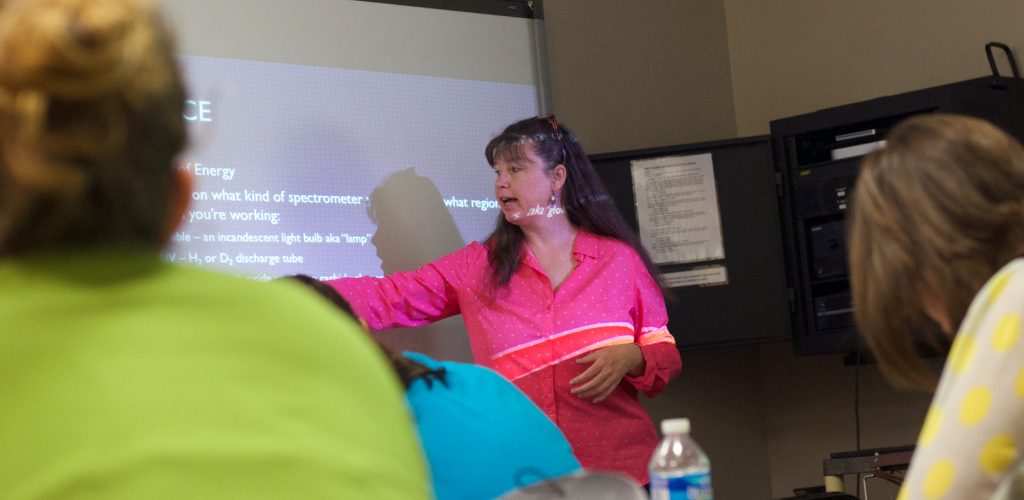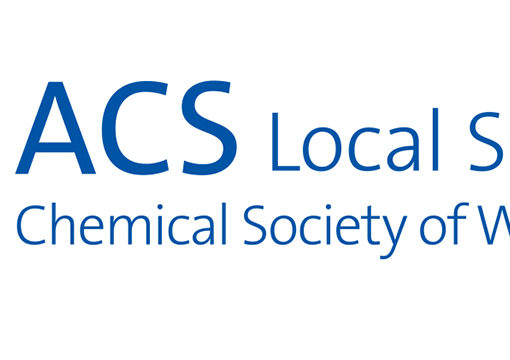By Jill Granger, Associate Dean of Academic Affairs and Professor of Chemistry
I’ve seen it on their faces for weeks. My Sweet Briar College students are still there, still sitting in their usual seats, still going through their usual motions. But their faces are pained, their eyes puffy, their smiles gone. Occasionally, when I turn from the board and look around the room, I see tears quietly streaming down a face.
Analytical Chemistry is not a subject that typically brings tears to a young person’s eyes. It’s not a touching subject. It is, as the name offers, quite analytical. Sophomore-level Analytical is the world of significant figures, dilution calculations, equilibria, titrations, potentiometry, and some spectroscopy, for fun. But Analytical Chemistry has not been on these students’ minds since the college’s Board of Directors announced the unexpected closure of the college to come at the end of this term.
I can see it in the numbers now. As classes have ended and the students are preparing for finals, I’m going through my usual motions, which includes doing a summary of their grades, getting my books in order, and filing my papers away. And, like my students, my face is pained, I drop my head to my desk, and I cry quietly. Again, Analytical Chemistry, it’s not normally emotional work. But I can see in the numbers an unequivocal evidence of the damage done to these young lives. The sadness morphs into anger when I hear the voices of our Board, with their talking points, dismissing the students’ loss as “collateral damage,” and their empty promises of a “seamless transition” and an “orderly wind-down.”
I feel protective and indignant when I hear the administration dismiss the human value of our current students when they say things like “students today don’t want to come to a women’s college,” or “students today don’t have the capability to pay” what we need to balance our budget. I want to say: These students want to be here. They are paying what they were asked to pay. They are important and they matter.
***
I just started using an online homework vendor for my Analytical class, a web-based site by Sapling Learning. Coupled with their textbooks, students got a set of homework problems to work on in each chapter and the system provided them with instant feedback, hints when asked, help when needed. I controlled selection of the problems, the difficulty, the mix of topics, and more. I liked the on-line homework because it gave my students more time with the material, more practice with problems, and immediate feedback, all of which is important in Analytical Chemistry, a problem-solving course. If the student sticks with a problem in the online system and keeps trying, her grade for an assignment will typically be in the 80’s or 90’s.
Before the closure announcement, my students were averaging 78.9 percent on their homework, overall. There were only 3 assignments in all that were turned in as a 0 (not attempted). After the announcement, my students averaged 34.8 percent on their homework, and this was with me extending deadlines, reopening closed homework, and being as accommodating as possible. I don’t need to look at my syllabus to see where the closure came in the term – I can see it as large as life in my spreadsheet of numbers. There were 20 assignments, post announcement that were turned in as a 0; and barely any completed assignments that were at or above the previous average.
These numbers are meaningful to me. I think they provide a kind of dispassionate sort of proof that some irreparable harm was done to these students. I put stock in what these on-line homework numbers say because the questions and assignments, set up by my Sapling Learning online TA and myself at the start of term, were not at all influenced by my own grief, trauma, and stress over the announcement of closure. They serve as a proxy, as a sort of meter that has registered and witnessed this traumatic event.
For these students, who are mostly nineteen or twenty, the closure of the college is likely the first major loss they have ever suffered, and it’s a strange loss at that. They are losing their college, their friends, their teammates, their hangouts, their study buddies, their lab partners, and their faculty, not to mention their credits, their grades, their options, their scholarships and aid packages, and their sense of well-being. Some of them will be fine, absolutely. Some may take a step back for now, but will make a comeback in days and months to come. And there are some students who will not weather this transition.
This is a practical point. While we like to think of college students cruising through their academic studies semester by semester, that is a gross simplification. For a vast number of students, their college experience is a series of good semester, bad semester, ups and downs, highs and lows, which average out above the threshold for the degree. For any student who happened to be at a lower point going into this semester, her aspirations may have gotten washed over by the swell of the impact of the closure announcement. Those are the ones I fear for the most, because they will not overcome this, and will likely never obtain a degree.
***

On the last day of class, the sense of loss was so palpable that I couldn’t bear to acknowledge it. It’s very likely that I won’t ever teach Analytical Chemistry again. As a full professor with 22 years of teaching at the same institution, and given the range of my work and scholarship, it’s much more likely that I will find a position in administration. Too old to start over and too young to retire, I’m hopeful that I will land a position that will afford me faculty status and the chance to teach on a regular basis – but I think it unlikely that it will be a majors course, like Analytical. Like our students, we faculty and staff face the same daunting set of compromises, but with families, mortgages, and responsibilities in tow.
A couple of weeks after the announcement, as the shock was beginning to wear off and the reality and sense of having been victimized was settling in, I said to one of my friends in our Physics Department, “we’ve lost our titles. We’ve lost our status as faculty members.” And his comforting words to me were, “But you still have your degree. You still have the Ph.D. They can’t take that away.”
Now that some time has passed, and the feeling of freefall has subsided, I’m able to see that my friend made a good point. As our semester is coming to a close, we face a few more difficult days and weeks ahead. Unfortunately, much of our situation is no clearer now than it was six weeks ago and it still feels terrible. In Analytical, students were talking about the necessity and meaning for the end of course evaluations. One student tried to explain, saying that, “They are trying to keep things as normal as possible.” Another student replied in frustration, “Well, they’re doing a pretty shitty job of it.”
“Can I quote you?” I asked.
Jill Nelson Granger is a Professor of Chemistry at Sweet Briar College and also serves as the Associate Dean of Academic Affairs, leading the college’s Honors Program and helping to direct college-wide assessment efforts. She earned a Ph.D. in Analytical Chemistry in 1993 at Purdue University and a BS degree in Chemistry in 1988 at Butler University. In addition to her teaching and administrative responsibilities, Jill is very involved in K-12 teacher professional development efforts in the STEM fields and has garnered over $2 million in extramural funding for support of the Central Virginia school divisions and their teachers over the past 15 years. Jill was awarded the 2007 Education Advocate of the Year Award by the AAUW of Virginia, and has twice been recognized, 2000 and 2011, by the Virginia Math and Science Coalition for a “Programs that Work” award. Jill and her husband Rob, who is also a Professor of Chemistry at Sweet Briar College, have raised four children on the Sweet Briar campus, the youngest of whom is currently a high school student at Amherst County High School.
Cover photo credit: Copyright Sweet Briar College. Photo by Meridith De Avila Khan.
If you are a student, faculty, staff member, or alumni of Sweet Briar and are interested in writing about your experience, we would love to hear your stories as well. Email us at thecapitalchemist@gmail.com.




8 thoughts on “Grief By The Numbers”
Dr. Jill Granger is one of the most wonderful professors I have ever known. As a STEM major, I was lucky to have experienced a course with her and once you know her, you cannot help but appreciate the difference her talent, compassion and high standards make in your future work. I did not love chemistry, but I loved learning Chemistry at Sweet Briar. I never thought I would get past Chemistry II, the required amount, but I did and continued through Organic II. My career depends on the skills I acquired in Jill’s classroom everyday. For this I will always be grateful. Her understanding of the grief and impact of the loss, even should we be able to save Sweet Briar, which I believe we will, speaks to the depth of care that Sweet Briar’s professors exhibited then and now. Whatever happens, I am grateful for the argument Jill put into the world with this article.
Thank you so much for your thoughtful article. We need to hear more from the students and professors in the media. I hope the Virginia Supreme Court will rule in favor of Saving Sweet Briar and that will allow a cascade of future positive rulings. Hopefully, this fall you and your husband will still be teaching at Sweet Briar College and raising your family on the campus.
#SaveSweetBriar
Dr. Granger is an amazing person and professor. She helped me tremendously in my career. She welcomed me into her family. She is one of rhe reasons Sweet Briar is so amazing. No where but at Sweet Briar do professors invest so much into their students lives. Study groups over dinner, being as available as needed to the student, the warmest smile and hug you could ever ask for . I got into vet school a year sooner than expected. It was half way through my junior year when I found out my destiny. I plannee my whole life to live this dream yet I cried because I got in early and had to leave Sweet Briar a year too Soon.
My acceptance was with the exception I pass BioChem. The only Biochem available that semester was Biochem 2 and I had never taken biochem 1. Dr. Granger told me it would be impossible for me to pass Biochem 2 without having taking Biochem 1. In the same breath she said but you know anything is possible with hard work. She spent countless extra hours to help me learn a year lf biochem in 1 semester. She saved my struggling family an extra years worth of college tuiton and she helped me start my veterinary career a year earlier. I am forever indebted to.Dr. Granger. The othrr professors at Sweet Briar are just as amazing. The world at large has no idea what a special place they are allowing to close. Leaders of the future will be Lost .
There is a reason so many are fighting for such a small school. This isnt just a school. Sweet Briar isna community of people that care unlike any place on Earth. They have shaped me and many others to be extraordinary human beings. I pray the Supreme court of VA comes through for the future of countless women who should be allowed to earn the rose and for all of these professors who have dedicated so much to truly produce individuals that make the world a better place.
Jill Granger was one of the best professors I had at Sweet Briar. Not much of a scientist I took a chemistry class with her that was basically the college version of the Chemistry in the Community class I had taken in high school. As an overscheduled freshman, I was unable to take the lab for the class until the next year. The lab relied heavily on the topics being discussed in class. Frustrated to tears several times trying to write lab reports relating my experiments to discussion I had long forgotten, Prof. Granger took time to sit with me and help me through. Like other professors at my dear liberal arts college, she knew that not everyone in her class was looking to be a chemist (or mathematician, or historian, or writer…) and that for some of us it was just about the learning.
And her son Max, just a preschooler back then, still owes me a date at Chuck E. Cheese.
Ms Granger was a memorable and huge role model for my time in college. While SBC has always had successful women working in scientific fields, Ms Granger was above and beyond. She was the first young woman I met who was successfully juggling a baby, husband, and a new job. Quietly watching her during her first few years at Sweet Briar, I suddenly knew I was going to be able to do it all too. This is what Sweet Briar has always done well. They connect powerful successful women with the next generation. Thanks Ms Granger I never forgot you.
I was a less than awesome student who changed majors 3 times and finally finished my work in December 1978 and walked with the class of 1979. I transferred from Hobart & William Smith with only 3 credits that transferred, i.e. (were C or above).
Having spent 3 yrs at St Timothy’s School outside Baltimore and loving it, I felt sure it was time to be in a coed school. However, qualities And values that I had been raised with and I expected in the institution I attended . Pride in Oneself and in ones surroundings was truly lacking at the school I chose. I admitted my mistake and transferred to Sweet Briar, which had wanted me to apply early decision in the first place!
On Parents weekend, I sat in Chapel listening to parents ask a panel of various people in charge very leading questions (their daughters were obviously homesick and unhappy and the more I listened the more frustrated I became with the answers the acting Dean was giving , so I stood up and gave an unsolicited rebuttal. Stating that I had been on the ‘other side of the fence’, and unlike my former experience, what was stated in the college handbook was indeed true at Sweet Briar! The Faculty /student ratio has always been in the students favor. You aren’t a number, but are missed when you aren’t in attendance. And everyone is approachable and interested in your success.
All that was really necessary was to a to ask for guidance , want to succeed , and do the work necessary The faculty and staff and advisers would go out of their way to help. But, you had to take charge and ASK for direction.
I pleaded with the parents not to step in and ‘fix”‘ their daughters problems, but to insist that they do so themselves. It was a question of experiential learning, how to get help in fixing ones own problems. Learning how to learn.
In hind sight, Throughout my non-stellar academic career, that statement held true. Learn how to clean up your own messes/problems and do so!
There were many who shown more brightly academically,and/or socially, but none who could possibly have loved and Valued their time at The Patch more than I.
There needs to be single sex higher education available. We may need to restructure how we go about it. Possibly adding men to a graduate level . We need more time to investigate the possibilities with a larger forum,. Mistakes have been made in the past, but no institution can survive without an active admissions effort!
There are too many lives and livelihoods in the balance. There will need to be Large $s (possibly solicited by decade rather than just individuals). You’ve got our attention let’s work together to make it succeed.
Don’t throw the .baby out with the bath water ! Give us time to restructure.All is not broken, just parts.
Let’s get the cards on the table and figure out how to Succeed!
Dear Jill, It tore at my heart to read your article. I was a chemistry major at Sweet Briar and I loved chemistry, and especially analytical chemistry, with all my heart. (I now have a PhD in analytical chemistry.) My teachers, Miss Thompson and several others, guided me through all 4 years–freshman, qualitative analysis, quantitative analysis, organic, physical; and two honors units. I love every minute of it.
I sometimes wonder what the chemistry curriculum is like now. I don’t remember that there were other courses apart from the basic ones and the ones they invented just for me, but I bet there are now.
For the upperclass labs, do you still get out the special big beakers and have coffee after the lab finishes? The beakers having been kept aside especially for that purpose? Often the instructors would bring cookies or something.
What a wonderful experience Sweet Briar was for me.
I am doing all I can–which is not much–to help rescue the college. But it, and especially my chemistry classes, will live on in my life for ever. Thank you for all you have done.
Ginger Greene
You and your students are not forgotten. I cannot believe that the world at large will allow this travesty to play out the way the KSB’er are hoping it will. Hang it there. This shall not come to pass. You will be teaching in the fall.